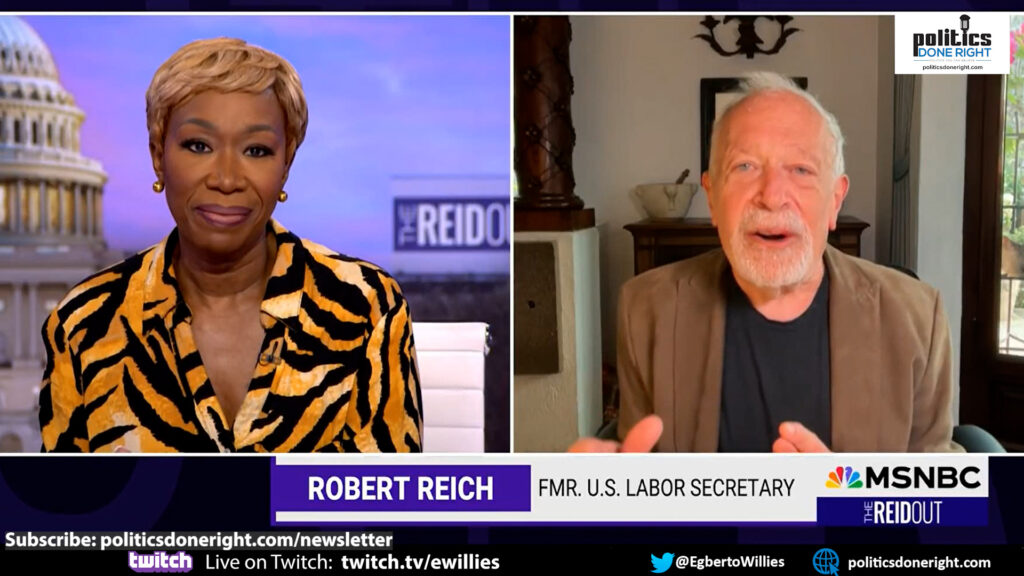Joy-Ann Reid and Robert Reich provided the best coverage of the insane TikTok fiasco. Unlike the shallow coverage elsewhere, they hit the real issues.
Joy-Ann Reid nailed the correct TikTok narrative.
Podcasts (Video — Audio)
In a compelling narrative interwoven with assertive commentary, Joy-Ann Reid‘s coverage on TikTok delves deep into the complex web of geopolitical tensions, the wielding power of billionaires, and the undeniable impact on freedom of speech. Through her program, The ReidOut, Reid, with the insight of Robert Reich, unravels the ostensibly straightforward narrative about TikTok’s potential ban in the United States, guiding her audience through the murky waters of political maneuvering, the influence of big money, and the broader implications for American democracy.
At the heart of this discourse lies the decision by the U.S. House of Representatives to potentially force TikTok’s parent company, ByteDance, to divest the social media platform to an American entity. This move, ostensibly made on national security grounds due to ByteDance’s Chinese ties and the Chinese government’s minor stake, raises critical questions about the real motives behind such legislative actions. Reid and Reich critically analyze this development, highlighting the incongruity of targeting TikTok while American billionaires and companies, with their extensive global stakes and equally significant data privacy concerns, continue to operate with minimal scrutiny.
Reid’s investigative prowess shines as she probes Congress’s selective outrage toward TikTok, juxtaposing it with the leniency shown towards American tech giants known for data breaches, dissemination of disinformation, and facilitating hate speech. This critique extends to American oligarchs, like Elon Musk and Mark Zuckerberg, whose platforms have been battlegrounds for undermining democracy and social cohesion. The analysis suggests a glaring double standard in treating American versus foreign-owned tech companies, underscoring the hypocrisy in the congressional response to TikTok.
The conversation takes a significant turn with the revelation that former Trump treasury secretary Steven Mnuchin is among those eyeing TikTok’s acquisition. This development, infused with MAGA politics, hints at a deeper agenda to control digital narratives and further consolidate wealth and influence among America’s elite. Reid and Reich challenge the audience to question whether American billionaires are more trustworthy guardians of privacy and democracy than foreign entities. This inquiry is crucial, considering the growing concentration of media and technological power in the hands of a few American magnates.
Moreover, Reid’s coverage brings to light the broader implications for free speech and access to digital platforms. With nearly 170 million Americans using TikTok, a ban or forced sale under dubious pretenses undermines the First Amendment and threatens millions’ livelihoods and creative expression. The discourse extends to the role of technology platforms as modern public utilities, suggesting that regulation, rather than bans or forced divestitures, maybe a more principled approach to ensuring data privacy and safeguarding democracy.
The TikTok narrative and congressional vote are all wrong. The issue has nothing to do with national security but reciprocity.
The national security angle is used to fool most without technical knowledge of how the internet works. China does not need TikTok to get our personal information or mislead us. Our capitalist platforms have always been willing to sell our souls for the mighty dollar. China can buy all that information on the open market and control us by paying the “capitalist patriots” for ads of all forms used to deceive us all.
The reciprocity angle is honest and makes more sense. We can’t operate Facebook and our social media unfettered in China, so why did we allow access to our markets in the first place? Follow the money. Many Americans have legally built their businesses on the TikTok platform. Are we going to kill millions of businesses created on TikTok because we want to stick it to China? Congress wants to force a sale to U.S. oligarchs under false pretenses.
Let’s be clear. TikTok is technically much better than all the other platforms. Our “capitalist oligarchs,” like parasites, want to do what they do best: steal someone else’s intellect and property with false justifications.
Joy-Ann Reid and Robert Reich’s analysis transcends the surface-level narrative, exposing the underlying power dynamics and the real stakes for American democracy in the TikTok saga. It is a call to action for a more nuanced understanding of technology’s role in society, the importance of safeguarding digital freedoms, and the need to assess the motivations behind political decisions critically. Their coverage serves as a clarion call for vigilant citizenship in the digital age, urging Americans to look beyond partisan politics and consider the long-term implications of allowing billionaires to dictate the flow of information and ideas in the public sphere.
We work extremely hard to research and seed the internet with truthful, fact-based information to counter the misinformation from the Right and others who would have us vote against our interests. Corporations and billionaires ensure the Right-Wing & MAGA are well funded. We have you, our grassroots. Please support us today.
Make a one-time donation
Make a monthly donation
Make a yearly donation
Choose an amount
Or enter a custom amount.
Your contribution is appreciated.
Your contribution is appreciated.
Your contribution is appreciated.
DonateDonate monthlyDonate yearly
